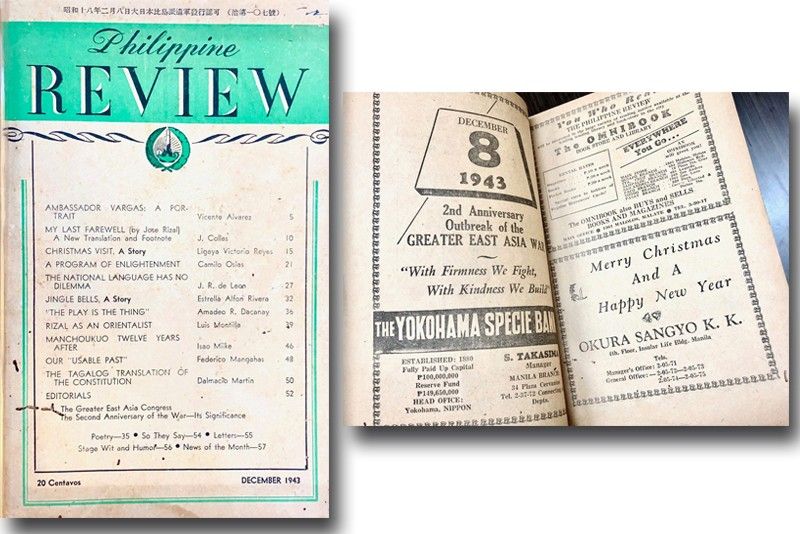Writers in wartime

It’s a fascinating window on literature in a time of war, what the politics of the moment can do to writers, and what coping strategies they employ.
I was busy a couple of weeks ago going through my library to see which books I could donate to a sale being conducted by our students to benefit worthwhile projects. I happily gave away about a hundred books and will be ready and willing to unload even more next time. But what inevitably happens when you sort out your effects like this is that long-forgotten objects turn up in the pile.
One such item that emerged from this recent overhaul was a thin journal of no more than 70 pages, the December 1943 issue of Philippine Review, published by the Manila Sinbun-sya and edited by Vicente Albano Pacis, with Angel C. Anden and Jose Luna Castro as associate editors. A little research shows that the Review didn’t last very long—it ran from March 1943 and closed down in December 1944. But during that brief lifetime, it managed to publish such later luminaries as Nick Joaquin, and apparently enjoyed quite a reputation (it was also edited for some time by Francisco “Mang Kiko” Icasiano, whose musings “From My Nipa Hut” graced the prewar Sunday Tribune Magazine).
Indeed, this issue of December 1943 contained not only short stories by Ligaya Victorio Reyes and Estrella Alfon Rivera, essays by Camilo Osias, Luis Montilla, and Federico Mangahas, and a translation of Mi Ultimo Adios by Juan Collas, but also a short commentary on the language of the Constitution by a 22-year-old Jovito R. Salonga, who had just been released from prison for his work in the underground.
It’s a fascinating window on literature in a time of war, what the politics of the moment can do to writers, and what coping strategies they employ. (My thoughts strayed quickly to a recent discussion online about Filipino writers and politics in these times of tokhang.) The issue opens with paid advertisements — mostly from Japanese companies like the Yokohama Specie Bank’s local branch — hailing “The Second Anniversary of the Outbreak of the Greater East Asia War” while at the same time greeting readers a “Merry Christmas!”
The Reyes and Alfon stories (“Christmas Visit” and “Jingle Bells”) speak of love and loss, acknowledging the sudden shift in the meaning of Christmas from that December of just two years ago to this one; both stories end with their protagonists weeping uncontrollably. The Reyes story can’t help falling back on old tropes, referring to “Gary Cooper.” So for the fictionists, at least, the transition remains sharp and painful, with metaphors to imply the darkening of the times.
Most of the essayists seem to have no such qualms. In his essay on “A Program of Enlightenment,” Camilo Osias (yes, he of the Philippine Readers series, and future Senate President) argues for a new culture “for all Filipinos under an independent Philippines,” one “characterized by a sound eclecticism in the choice of its elements — by the same careful eclecticism which the Japanese have observed in their cultural borrowings…. The cultural activities to be carried out shall emphasize the precedence of State, national, or social interests over those of the individual.”
For his part, the scholar Luis Montilla writes on the theme of “Rizal as an Orientalist,” and suggests that Rizal would have been sympathetic to Japanese motives had he been alive, even implying that this could be because Rizal was partly Japanese. In his footnotes, he quotes Austin Craig’s statement in 1940 that “I am putting the finishing touches to my Rizal genealogy, now being able to show Japanese blood as well as two Spanish and five Chinese ancestors. I have church or court certificates proving everything.”
Montilla concludes: “Having had his attention directed early to the abuses, calumnies, and indignities heaped unjustly upon his people by the white race, Rizal had to be, and was, the embodiment of a true Oriental…. Now, the duly authorized representatives of the great Japanese Empire have repeatedly assured the Filipinos that Japan has come to these shores not to subjugate the natives of the country, much less to absorb them, but to guide them in their regeneration as true Filipinos, and that when they… shall have been so rejuvenated as to be, as a nation, worthy of membership in the family of Oriental nations, they will regain their long lost independence (and fully realize) the supreme efforts put up by Rizal as an Oriental to help educate and re-Orientalize his people for their preservation and dignification as a race….”
Was I reading a display of what might be called cultural collaboration? Not knowing these writers and the circumstances under which they worked, I have to withhold my judgment, keeping in mind as well that there was good reason for many Filipinos — after centuries of white-man rule — to accept the invading Japanese as liberators. But I felt much educated by these articles, which also reminded me of how our printed words define us, rightly or wrongly, long after we’re gone. They just might turn up in a dusty corner of someone’s bookshelf.
* * *
Email me at jose@dalisay.ph. and visit my blog at www.penmanila.ph.



















